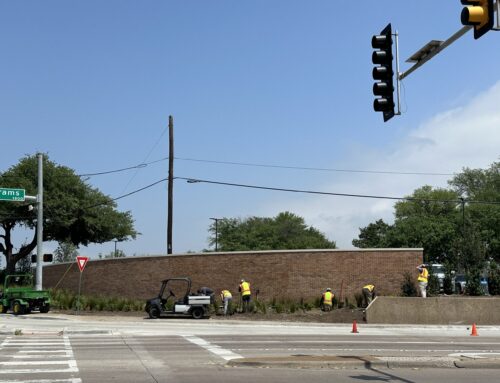
Douglas Dunn. Photography by Yuvie Styles.
“They did the crime,” it has been said, “they do the time.”
In this case, “they” are incarcerated or previously incarcerated women, specifically mothers either expecting a baby or with one or more children. And while the mothers have colored outside the lines enough to warrant imprisonment, their children have not.
That’s why neighborhood attorney Douglas Dunn has founded Mercy’s Shore, an in-development, Christ-centered venture to help newly released moms, but more importantly, their little ones, so that the children aren’t doomed to their mothers’ often-hopeless fate.
Dunn practiced law for 27 years, handling perhaps as many as 1,500 child welfare cases, he says. In some, he represented children as guardian ad litem; in others, mothers whose parental rights were at stake, for either neglect or child abuse. Later, he was appointed truancy court magistrate for one of the Dallas County Truancy Courts, a position he held for five years.
After years in the legal business, Dunn says he felt God’s calling to join the staff at Exodus Ministries in our neighborhood as director of development. Exodus Ministries is a non-denominational Christian nonprofit that implements a comprehensive residential discipleship initiative for mothers reuniting with their children.
“During my tenure at Exodus Ministries, I developed a deep passion for serving the children of moms who had been incarcerated and were re-entering society, and for the moms themselves,” Dunn says.
“Mercy’s Shore is an opportunity to take what I have learned and create a program that will provide children with an opportunity to have a life unlike the one their moms have lived.”
The project will offer grace and second chances to single moms and children from birth to age 12, he says.
“Saying women — moms or not — deserve it (incarceration) is a short-term response, because we all pay for it,” says retired Dallas County Criminal District Court Judge Gracie Lewis. “It makes more sense to put them in a position where they can be productive.”
The costs and numbers for this population in Texas:
• 13,000 women in state prisons
• $22,012 is the annual cost taxpayers fund to house a single inmate
• 81% of women in the state corrections system are mothers
• Nearly 60% in a survey responded that they were victims of sexual assault
• 82% had histories as domestic violence victims
“In Texas, the number of women in jails awaiting trial — totaling around 6,300 — has grown 48% since 2011, compared to an increase of 11% for men over that time period. However, the number of female arrests in Texas has decreased 20% since 2011, suggesting the growth of women in Texas jails is not the result of rising crime.” — Texas Center for Justice and Equity.
“I’ve seen parents who make mistakes where they go to jail in their 20s or 30s, or are homeless, but they get it together because someone helped them. They need a support system,” Lewis says. “Having been involved in CPS and the criminal justice systems, I know there is a direct link in absent parents, especially mothers going into the system.”
“We can’t assume all these kids are ‘throw-aways,’ many have talents that are especially impressive when you look at their backgrounds.”
Lewis says moms often want their children back when they are released from incarceration but typically don’t have the resources or even the parenting experience to handle them. These children are more likely to wind up in the juvenile justice system, then graduate to the criminal system, or they end up having their own children and end up in CPS as children with children.
Mercy’s Shore plans to build or buy a 25-unit single-family, one- or two-bedroom apartment facility, Dunn says. He and the five-member board of directors are looking for such a property in close proximity to parole check-in locations. Mercy’s Shore will offer a nine- to 16-month program tailored to each family’s needs and progress. The program also will provide vocational and academic testing for moms’ aptitudes and interests.
“Some don’t have a GED,” Dunn says, “and securing that will be a first step. The first six months at Mercy’s Shore will be devoted to training, then they’ll be in a position to land a better job or learn a trade such as welding.”
Mother/child bonding will be a huge focus, he says. “We will be serving children and the best way to do that is by serving their moms.”
Classes in health, nutrition, exercise, 12-step recovery, finance, budgeting, Bible study and counseling, along with age-appropriate parenting classes are on the docket — “bumpers” and parameters to help the moms learn to navigate. Mercy’s Shore will teach critical thinking skills for long-term solutions, not impulsive ones, Dunn says. The venture hopes to have a cadre of employers as a resource.
Dallas County District Attorney John Creuzot says “Any form of reintegration is something we support, whether it be economic, family, social or religious. These efforts alone are helpful, and combined with a number of other reintegrative strategies and programs have been shown to significantly reduce recidivism.”
Dunn’s friend and former colleague Erleigh Norville Wiley is Kaufman County criminal district attorney and former Dallas County assistant district attorney.
“It doesn’t surprise me that Doug is connecting professionally his heart for incarcerated women,” she says.
“Almost all — if not every woman who gets incarcerated in Kaufman County — has a child, maybe even more. Someone has to take her kids. When you study criminal law and criminal justice reform, most of these women in custody are there because they were doing something for a guy; what better way to avoid recidivism than a program like this? And why not be in a structure to give them their kids back?”
While there are facilities that help single men and single women after being released from incarceration, Dunn says other than Exodus Ministries, there is no facility in the state that he knows of besides Mercy’s Shore with a comprehensive program that will serve both moms and children.
Currently, Dunn and its board are raising funds to purchase and renovate an existing facility or property to build on, hire staff and begin welcoming families to their new lives, hopefully in the next year.
“We can’t assume all these kids are ‘throw-aways’,” Lewis says. “Many have talents that are especially impressive when you look at their backgrounds.”
Learn more about Mercy’s Shore and how to help its children and moms by calling Dunn at 214.673.5836; email: doug@mercysshore.org.





